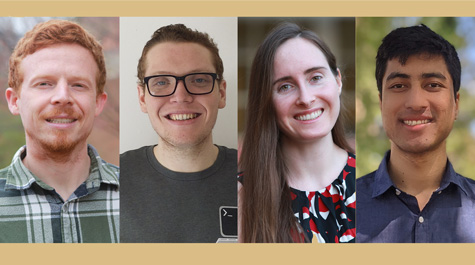Four graduate students recognized for excellence in mentoring undergrad researchers
Undergraduate involvement in research is a core component of a William & Mary education. The S. Laurie Sanderson Awards for Excellence in Undergraduate Mentoring recognizes the graduate students in Arts & Sciences who mentor undergraduate students.
The honors, presented annually by the Arts & Sciences Graduate Studies Advisory Board, are named for the former dean of graduate studies, who served from 2005 to 2012.
 “I'm delighted that the Graduate Studies Advisory Board recognizes the unique ways William & Mary graduate students contribute to undergraduate mentoring in research and scholarship outside the classroom,” said Laurie Sanderson, who now serves as chair of the university’s Department of Biology. “Our graduate students are valuable role models who help to guide undergraduate students through the transition to professional life. The special synergy between William & Mary undergraduate students, graduate students and faculty is highly successful.”
“I'm delighted that the Graduate Studies Advisory Board recognizes the unique ways William & Mary graduate students contribute to undergraduate mentoring in research and scholarship outside the classroom,” said Laurie Sanderson, who now serves as chair of the university’s Department of Biology. “Our graduate students are valuable role models who help to guide undergraduate students through the transition to professional life. The special synergy between William & Mary undergraduate students, graduate students and faculty is highly successful.”
Virginia Torczon, current dean of graduate studies, said that the presentation of the Sanderson Awards are a highlight of the luncheon at the annual Graduate Research Symposium, shelved this year because of the ongoing pandemic.
“While these are modest awards, they are greatly prized by the graduate students who receive them and greatly appreciated by the undergraduate students who submitted a nomination on their behalf,” Torczon said. “I know, because each year I sit at the lunch table with the award winners and listen to and marvel at their interactions with their undergraduate mentees.”
Nathan Cooper, 3rd year Ph.D., Department of Computer Science
Nathan Cooper’s doctoral adviser is Denys Poshyvanyk, working on using machine learning techniques to help software developers, particularly in mobile development such as the Android platform. Maddy Havranek ’22 joined the Poshyvanyk lab in the summer of 2020, and began working closely with Cooper.
“Nathan closely collaborated with Maddy on defining, designing, implementing and evaluating a framework for translating recorded videos of app usages into actionable test scripts,” Poshyvanyk explained in nominating Cooper for the Sanderson Award.
Cooper, Poshyvanyk wrote, has been an “exemplary mentor” to Havranek, “an outstanding undergraduate student.” Havranek was assigned to an extension of a project on which the Poshyvanyk lab had already made considerable progress, even publishing a paper. The work involves video screen recordings from apps, which are increasingly useful in developers addressing bugs and planning new releases.
The lab developed a software tool they called Video2Scenario (V2S) to automate the processing of the recorded video artifacts. Havranek was given responsibility for designing and testing deep-learning-based models, necessary to update the functionality and take V2S to the next level.
“All of these to-dos require me to build upon the original functionality of the tool, which Nathan is intimately familiar with, ” Havranek wrote in her support of Cooper’s candidacy for the Sanderson award. “Since the beginning of my involvement with the project, Nathan has been a source of knowledge, guidance, and patience.”
She noted that she is currently the only undergraduate working on the V2S project and credits Cooper for creating and maintaining a productive work environment.
“I was anxious that I would be looked down upon for my inexperience in the field and expected to complete all of the work on my own,” Havranek wrote. “This has been exactly the opposite of my experience. On the team that I work on, the philosophy is that no question is too simple or menial and that anything I need, I simply have to ask.”
The mentoring and working atmosphere in the lab paid off in many respects, including another paper on improvements to V2S — with Havranek as first author.
“Nathan suggested that I take point on this paper submission, and he helped guide me to complete the process and reach this substantial professional milestone as a researcher,” Havranek wrote. “By the end of our mentorship, I will also have submitted another academic paper for consideration as a first author.”
Luke Herchenroeder, 2nd year M.S. in Experimental Psychology, Department of Psychological Sciences
The lead coordinator of the BRAVO Lab, Luke Herchenroeder works with Assistant Professor Adrian Bravo. One of Herchenroeder’s responsibilities is training undergraduate members of the lab in research protocols.
“Luke has not only trained undergraduate students in research protocols but has also mentored them,” Bravo wrote in nominating Herchenroeder for the Sanderson Award. “Specifically, he has helped numerous undergraduate students in the lab with their research ideas and has helped co-author various manuscripts the undergraduate students are leading.”
Samantha Sorid ’21 is one of the undergraduates that have benefited from Herchenroeder’s mentoring. She joined Bravo in nominating Herchenroeder for the award.
“As an undergraduate, I have felt a bit uncertain about my statistical abilities in the past in regards to the research projects that I am working on,” Sorid wrote. “However, Luke was able to help me with several of these questions, so that I was able to gain a deeper understanding of the projects in the lab.”
Bravo writes that the Sorid-Herchenroeder mentoring relationship was particularly fruitful, resulting in a paper, "Anxiety symptoms and alcohol-related problems among college students: A moderated-mediation model of rumination and emotion dysregulation,” published in the peer-reviewed journal Substance Use and Misuse.
Herchenroeder regularly works with other undergrad lab members on their research and manuscripts, Bravo said. And Sorid gives her mentor a lot of credit for helping her achieve that first first-author paper, an important milestone in the career of any young researcher. She noted that Herchenroeder’s help with statistics was critical to the findings, and added that he helped her interpret the results.
“I am incredibly proud of our findings and the outcome of this project and this progress would not have been possible without Luke’s thoughtful edits and suggestions throughout the process,” Sorid wrote. “He helped me to communicate my findings in a clear and insightful way and I am extremely grateful for Luke's help and guidance.”
Sunil Manandhar, 5th year Ph.D., Department of Computer Science
Sunil Manandhar has mentored three undergraduates so far, and his guidance of Ruhao “Tony” Tang ’19 was particularly productive. Manandhar’s own advisor is Adwait Nadkarni, assistant professor of computer science; he is a member of Nadkarni’s Secure Platforms Lab, dedicated to improving security of the newest smartphones and other emerging technology.
Nadkarni’s colleague Denys Poshyvanyk nominated Manandhar for the Sanderson Award. Poshyvanyk said that Tang began working on application analysis problems with Nadkarni in 2018.
“Sunil took the initiative to begin mentoring Tony, and even learned several analysis techniques that were outside of his immediate research interest at that time, purely to assist Tony in his summer project,” Poshyvanyk, associate professor of computer science, wrote in his nomination letter.
Tang also nominated Manandhar, explaining that the two met when Tang was doing a summer research project related to smart-homes security issues.
“At that time, I was just beginning to do research and had no experience in that area,” Tang wrote. “But Sunil was the ideal mentor to me that led me to continue pursuing it. Whenever I came reached a deadlock on our project, he would help and guide me through it.”
That Manandhar-mentored research project won Tang the Stephen Park Undergraduate Research Award. Poshyvanyk added that Manandhar and Tang were co-authors on a paper accepted at the Institute of Electrical and Electronics Engineers Security & Privacy conference — “the top venue for computer security research, which is extremely rare for an undergraduate student,” he added.
Tang also related the help and encouragement given by Manandhar helped him through a rigorous interview process for an internship at the Lincoln Lab at MIT.
“Initially after hearing that I will have eight interviews in just two days, I felt nervous and afraid that I will not do well. But once I remembered the workflow I had with Sunil and began thinking the problem out loud, the whole interview process felt much more familiar and I felt less nervous and more confident,” Tang wrote. “I am certain I would not know what to say and undoubtedly lose the opportunity to work at MIT if I had not worked with Sunil throughout my last year at W&M.”
Tang ended his nomination letter by stating he just received a full-time job offer from the Lincoln Lab.
Emma Wedell, 2nd year M.S. in Experimental Psychology, Department of Psychological Sciences
Emma Wedell is the second member of the BRAVO Lab to win the Sanderson Award this year, along with Luke Herchenroeder.
She was nominated by Adrian Bravo, assistant professor in the Department of Psychological Sciences, and by Samantha Sorid ’21, one of several undergraduates in the lab mentored by Wedell. Sorid related in her nomination document how Wedell helped her along the road from lab newbie to published author.
“As I gained more experience in the lab, I decided that I was going to write a manuscript,” Sorid wrote in nominating Wedell. “I asked Emma if she would help as a supporting author and mentor, and she agreed without hesitation. Emma also played a main role in helping to edit the manuscript. All of her comments were clear, well thought out, and insightful.”
With Wedell’s help, that manuscript became a paper published in a good peer-reviewed journal. Sorid is the first author on "Anxiety symptoms and alcohol-related problems among college students: A moderated-mediation model of rumination and emotion dysregulation,” in Substance Use and Misuse. Wedell and Herchenroeder are co-authors.
Bravo noted that Wedell has guided undergrads through the multitude of procedures and processes of a human-behavior laboratory — recruiting participants, collecting data through specific interview protocols, survey building, conducting quantitative analyses.
“Emma always reaches out to ask questions about how to be a better mentor,” Bravo wrote. “These qualities are not ones that can be easily taught, and it just highlights the strong character, drive and leadership that Emma possesses, and she is an invaluable mentor of my students.”
Sorid weighed in on other positive qualities that Wedell demonstrated as a mentor.
“In general, Emma helped me to gain more confidence in my overall research abilities. She was always understanding and was able to provide feedback in a kind and constructive manner,” Sorid said.















